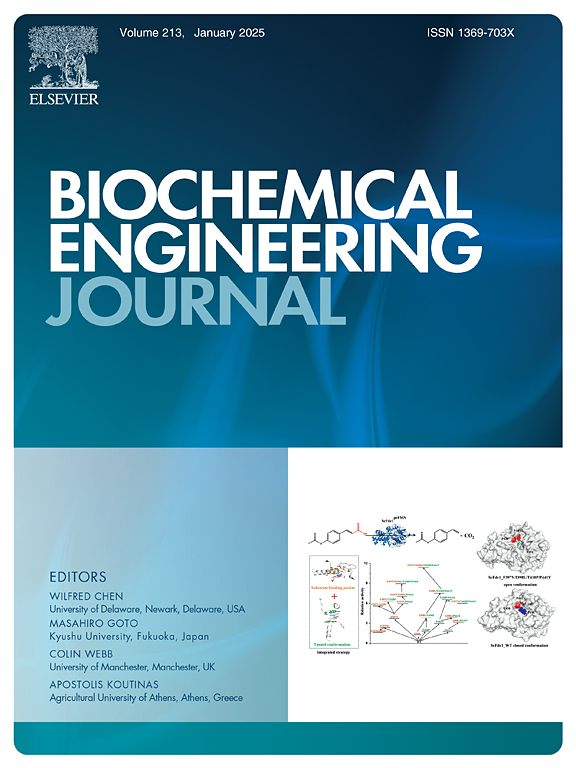Aerobic simulated biodegradation of novel brominated flame retardants: Systems and mechanisms
IF 3.7
3区 生物学
Q2 BIOTECHNOLOGY & APPLIED MICROBIOLOGY
引用次数: 0
Abstract
Novel brominated flame retardants (NBFRs), widely used alternatives to phase-out traditional BFRs, raise environmental and health concerns, necessitating systematic evaluation of their degradability and removal mechanisms. This study developed and validated an aerobic simulated biodegradation method based on Chinese conventional activated sludge process to assess selected NBFRs (TBPH, TBC, TBPAE). Under optimized conditions (hydraulic retention time of 9 h; mixed liquor suspended solids of 3.5 g·L−1), 60-day removal rates of TBPH, TBC, and TBPAE were 16.78 %, 35.76 %, and 64.99 %, respectively. Non-targeted screening identified potential degradation products, and plausible biodegradation pathways, primarily involving debromination and hydrolysis, were proposed. Metagenomic analysis revealed dominant microbial strains, such as Rhodanobacter, with degradation potential and identified their associated functional genes. To the best of our knowledge, this represents the first systematic study of the aerobic biodegradation of NBFRs, providing valuable insights into their persistence and environmental risks.
新型溴化阻燃剂的有氧模拟生物降解:系统和机制
新型溴化阻燃剂作为逐步淘汰传统溴化阻燃剂的广泛替代品,引起了环境和健康问题,需要对其降解性和去除机制进行系统评价。本研究开发并验证了一种基于中国传统活性污泥法的好氧模拟生物降解方法,以评估选定的nbfr (TBPH, TBC, TBPAE)。优化条件下(水力停留时间为9 h;混合液悬浮物浓度为3.5 g·L−1),60 d对TBPH、TBC和TBPAE的去除率分别为16.78 %、35.76 %和64.99 %。非靶向筛选确定了潜在的降解产物,并提出了可行的生物降解途径,主要涉及脱溴和水解。宏基因组分析显示,罗丹诺杆菌等优势微生物菌株具有降解潜力,并鉴定了其相关功能基因。据我们所知,这是对nfrs有氧生物降解的首次系统研究,为其持久性和环境风险提供了有价值的见解。
本文章由计算机程序翻译,如有差异,请以英文原文为准。
求助全文
约1分钟内获得全文
求助全文
来源期刊

Biochemical Engineering Journal
工程技术-工程:化工
CiteScore
7.10
自引率
5.10%
发文量
380
审稿时长
34 days
期刊介绍:
The Biochemical Engineering Journal aims to promote progress in the crucial chemical engineering aspects of the development of biological processes associated with everything from raw materials preparation to product recovery relevant to industries as diverse as medical/healthcare, industrial biotechnology, and environmental biotechnology.
The Journal welcomes full length original research papers, short communications, and review papers* in the following research fields:
Biocatalysis (enzyme or microbial) and biotransformations, including immobilized biocatalyst preparation and kinetics
Biosensors and Biodevices including biofabrication and novel fuel cell development
Bioseparations including scale-up and protein refolding/renaturation
Environmental Bioengineering including bioconversion, bioremediation, and microbial fuel cells
Bioreactor Systems including characterization, optimization and scale-up
Bioresources and Biorefinery Engineering including biomass conversion, biofuels, bioenergy, and optimization
Industrial Biotechnology including specialty chemicals, platform chemicals and neutraceuticals
Biomaterials and Tissue Engineering including bioartificial organs, cell encapsulation, and controlled release
Cell Culture Engineering (plant, animal or insect cells) including viral vectors, monoclonal antibodies, recombinant proteins, vaccines, and secondary metabolites
Cell Therapies and Stem Cells including pluripotent, mesenchymal and hematopoietic stem cells; immunotherapies; tissue-specific differentiation; and cryopreservation
Metabolic Engineering, Systems and Synthetic Biology including OMICS, bioinformatics, in silico biology, and metabolic flux analysis
Protein Engineering including enzyme engineering and directed evolution.
 求助内容:
求助内容: 应助结果提醒方式:
应助结果提醒方式:


